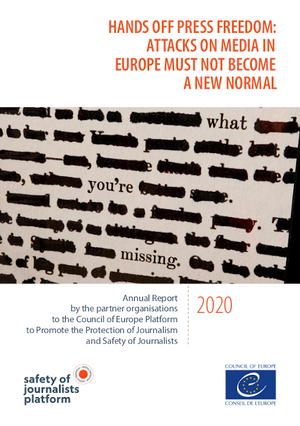Council of Europe reports a wave of attacks on media freedom
New report details 142 serious threats to media freedom.
Attacks on press freedom in Europe are at serious risk of becoming a new normal, 14 international press freedom groups and journalists' organisations, including the European Federation of Journalists (EFJ), warn.

© Private
The organisations work together on the Council of Europe Platform for the Protection of Journalists. The platform has today launched their annual report.
The report analyses alerts submitted to the platform in 2019 and shows a growing pattern of intimidation to silence journalists.
The past weeks have accelerated this trend, with the coronavirus pandemic producing a new wave of serious threats and attacks. In response to the health crisis, governments have detained journalists, expanded surveillance and passed new laws to punish 'fake news' without independent oversight bodies.
The overall response rate by member states to the platform rose slightly to 60 percent in 2019. Russia, Turkey, and Azerbaijan – three of the biggest media freedom violators – continue to ignore platform alerts, together with Bosnia and Herzegovina.
The platform recorded 142 serious threats to media freedom, including 33 physical attacks against journalists, 17 new cases of detention and imprisonment and 43 cases of harassment and intimidation.
The physical attacks included two killings – Lyra McKee in Northern Ireland and Vadym Komarov in Ukraine.
The platform officially declared the murders of Daphne Caruana Galizia (2017) in Malta and Martin O'Hagan (2001) in Northern Ireland as impunity cases.
Only Slovakia showed progress in the fight against impunity, indicting the alleged mastermind and four others accused of murdering journalist Ján Kuciak and his fiancée, Martina Kušnírová.
At the end of 2019, the platform recorded 105 cases of journalists behind bars in the Council of Europe region, including 91 in Turkey. The situation has not improved in 2020. Despite the acute health threat, Turkey excluded journalists from a mass release of inmates in April 2020, and the second-biggest jailer, Azerbaijan, has made new arrests over critical coverage of the country's coronavirus response.
Last year also saw an increase in judicial or administrative harassment against journalists, including SLAPP cases, and politically motivated legal threats. Prominent examples were the false drug charges filed against Russian investigative journalist Ivan Golunov and the continued imprisonment of journalists in Ukraine's Russia-controlled Crimea.
Governments have used the Covid-19 crisis to strengthened the tools available to harass journalists and these new tools have been introduced as 'fake news' laws in Hungary and Russia.
Expanded surveillance measures threatening journalists' ability to protect their sources France, Poland and Switzerland. Media ownership and market manipulation has also been used as a political manoeuvre with Hungary as the leading example.
The platform calls for urgent scrutiny of extraordinary new powers introduced as emergency legislation that are not strictly necessary and proportionate in response to the coronavirus pandemic. Uncontrolled and unlimited state of emergency laws are open to abuse and have already had a severe chilling effect on the ability of the media to report and scrutinise the actions of the authorities.
The ongoing crisis demands a more urgent and stringent response to protect media freedom and freedom of expression and information. The platform also highlights that support for the financial sustainability of independent professional journalism is needed.
In the age of emergency rule, protecting the media as the watchdog of democracy cannot wait.

Hands off press freedom: attacks on media in Europe must not become a new normal (2020)
Annual Report by the partner organisations to the Council of Europe Platform to Promote the Protection of Journalism and Safety of Journalists.
